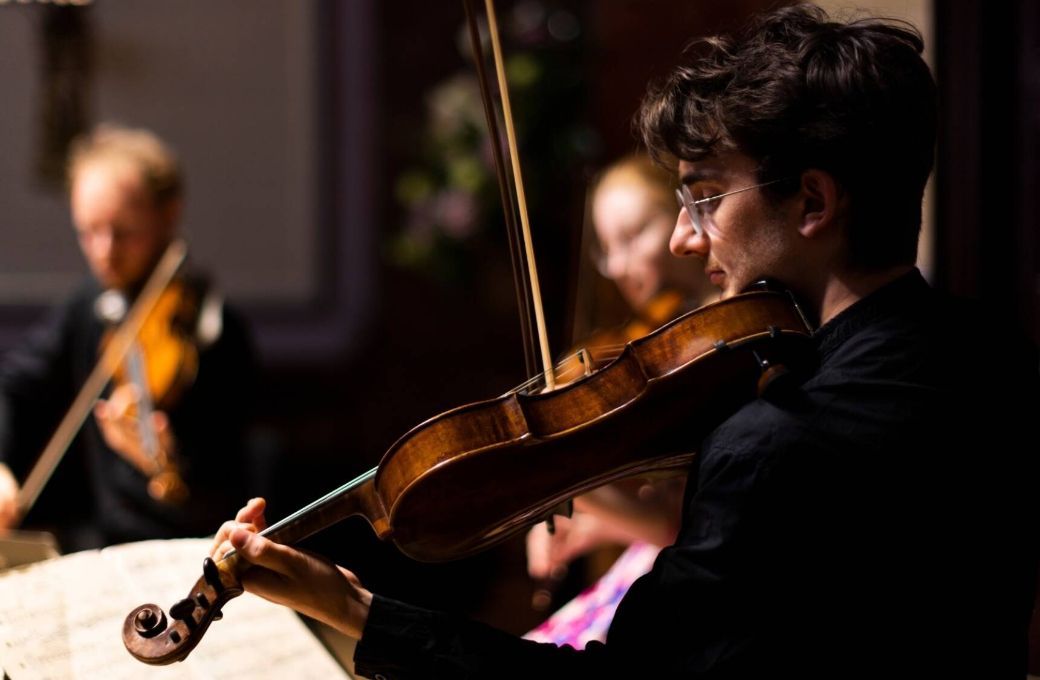“I know so many people who leave music college and have to get a part-time job to survive,” says young viola player Elliot Kempton. Despite years of practice, many young musicians face a reality where “they can’t even pursue music,” often for financial reasons. “It’s such a demanding profession and it really needs 100% of your time to do it.”

Kempton is blunt: “the concert fees you do get for performing don’t always add up to a livable wage in the early stages” of a career. Especially in a city like London, the pressures for young musicians who do not come from wealth are acute. “It’s vital for there to be funding to enable musicians to survive and practice.”
One program aiming to do just that is the London Symphony Orchestra’s Conservatoire Scholarships Scheme. Open to pre-professional and early career musicians, the scheme aims to remove financial barriers to study and training by providing financial support and partnerships with established musicians in the field. It’s given Kempton a great deal of confidence, and has allowed him to focus on professional life as a performer while also continuing with musical studies.
Kempton was practically born with a bow in his hand. The son of two string players, he took up violin at a young age, fitting right in with his musical family. “I was constantly surrounded by music growing up,” he says. “Seeing [my parents] play the violin, it was only natural that I wanted to have a go for myself.”
Along with his two brothers – a cellist and a guitarist, respectively – Kempton’s early education focused on playing chamber music with his family. His parents remained his primary teachers until the age of 18, when he enrolled at the Royal Welsh College of Music & Drama in Cardiff. These joint foundations – an intimate learning experience at home, followed by a more structured conservatory education – established his desire to focus primarily on chamber music as an early career professional.
“I learned in a way – unconventional might be a bit strong, but music at home was something for fun, and I pretty much learned through chamber music,” Kempton says. “It’s a really lovely way to learn. It’s funny, but conservatoire was sort of my first formal lesson in a way, which is a slight shock to the system. I feel so lucky now to be doing chamber music as a living, because that is what I’ve always done.”
Although Kempton began on the violin like his parents, he found himself drawn to the viola when he turned 14. He explained that his shift in instrument preference was more than just an act of teenage rebellion. “Viola came a bit later, just because it’s a bigger instrument,” he says. “I suppose I found I was more drawn to the viola as an instrument because of the sound and the role it plays. I feel that the viola has a much more human sound to it. The violin and cello are so well proportioned as instruments. They effortlessly project, they effortlessly ring. Every time I play the violin, I think ‘Ah this is so nice that everything works!’ The viola doesn’t work in that way. It’s far too small of an instrument for it to properly project – it would have to be double the size of a conventional viola.”
Quickly, though, Kempton knew that he had found his calling as he dug deeper into the viola repertoire. “It has a very peculiar sound, and I like that peculiarity,” he says. “That’s what makes it sound very human to me. I think it’s not a coincidence that much of the viola repertoire is introspective. Maybe that’s why there’s so much British viola repertoire. That’s the sound I’m always striving to make.”
Kempton is now a member of the Fibonacci Quartet, established in 2019, the winner of several chamber music awards in the years since, including the Paolo Borciani International String Quartet Competition. “String quartet is my living now, and I love the role the viola plays,” Kempton continues. “It’s really in the middle of everything. You’re the connection between all the instruments. Within my quartet, I’m very much a viola player now, which I’m happy about. I feel at home on that instrument.”
Following his graduation from Royal Welsh College, the LSO scholarship enabled Kempton to study at Guildhall School of Music & Drama in London, where the Fibonacci Quartet was originally founded.
“The scholarship was launched as a way of helping people from underprivileged backgrounds and low-income families in dealing with the economic realities one faces when studying music,” Kempton explains. “If I didn’t get this scholarship, I wouldn’t have been able to continue studying and staying in London. I did my undergraduate degree in Cardiff, and then through saving and working, I managed to move to London. But the reality is that no one can really afford staying and studying in London unless you have significant financial means yourself. I still feel very much indebted to the LSO for giving me the opportunity to focus on my studies, because without that, I would have been working and traveling all around the UK to support myself. The financial support is a really big part of it.”
In addition to easing the monetary burden of a life in the arts, the scheme provides musicians like Kempton with the opportunity to learn directly from current LSO members. Steve Doman, a viola section member of the LSO, has acted as Kempton’s mentor in recent years.
“You can never have too many lessons,” Kempton said. “Getting that opportunity to work with Steve on top of the financial support was incredible. Every single person I meet, I learn something new from them. It was exciting to have a new person to play for, and someone who could mentor me on my career.”
Equally important is the sense of community that Kempton feels as a member of the scheme. “There is a real feeling of a musician network – there are 10 musicians who get the award,” he says. “It’s very easy to feel lonely in music. I’m extremely fortunate that I play in a quartet, and I consistently have three other people that I can talk to. If you’re on your own, it’s very hard to find someone to talk to who is in the same stage of life. The scholarship really provides that community. Just knowing there are others who are in a similar position is really nice.”
In his conversations with Doman and his fellow scholars, Kempton has also been able to grasp the realities of life as a working musician – a topic that doesn’t come up often in the conservatory setting. “I completely understand and agree with how conservatoires work, which is that you are there to focus on yourself,” he said. “I think that’s absolutely vital in terms of being the best musician you can be. I’m glad that when I was at conservatoire, I was focused only on improving as a musician. On the other side, you really need to know how the profession actually works. Unless there are other things like the LSO scheme, it is really hard to find those resources… Talking to Steve just about how I get work, how I can graduate and ensure I can make some kind of living, that was great.”
Kempton believes that funding opportunities like the LSO Conservatoire Scholarship are essential to allow the next generation of performers to place their focus squarely on music once they graduate into the professional world.
“It’s so vital because there are so many young people who can’t survive unless these scholarships are available. Especially with all the expenses that go into the career – if you’re a string player, you have the instrument, the bow, strings, maintenance, insurance. Sadly as well, I cannot really stress enough how important it is for these programs to exist. If I hadn’t received the LSO scholarship, I would definitely be in a different place.”
The LSO Conservatoire Scholarships Scheme is open to postgraduate instrumentalists of any age or nationality. The application deadline is 12pm on 10th March 2026. More information for applicants is available here.
See upcoming performances by Elliot Kempton and the Fibonacci Quartet.
This article was sponsored by London Symphony Orchestra.


